Course Negotiations: Analysis, Strategies and Outcomes Report
VerifiedAdded on 2023/04/21
|6
|1120
|226
Report
AI Summary
This report delves into the complexities of negotiations, specifically examining the context of CEPA and Utopia. It analyzes the impact of language barriers in Western-style negotiations and emphasizes the importance of compromise as a key strategy for building relationships and trust, especially in the face of differing ideologies and legal frameworks. The report highlights the advantages and disadvantages of the compromise style, advocating for win-win outcomes and the utilization of interactive methods. It addresses the need for understanding cultural differences and the potential for intervention by external forces, emphasizing the importance of dialogue and considering the interests of all parties involved, particularly the citizens. The report also references the importance of respecting different perspectives to reduce arguments and foster a conducive environment for negotiation and the need for common goals and interests to facilitate agreements.

Negotiations 1
NEGOTIATIONS
Student’s Name
University
Course
Date
NEGOTIATIONS
Student’s Name
University
Course
Date
Paraphrase This Document
Need a fresh take? Get an instant paraphrase of this document with our AI Paraphraser
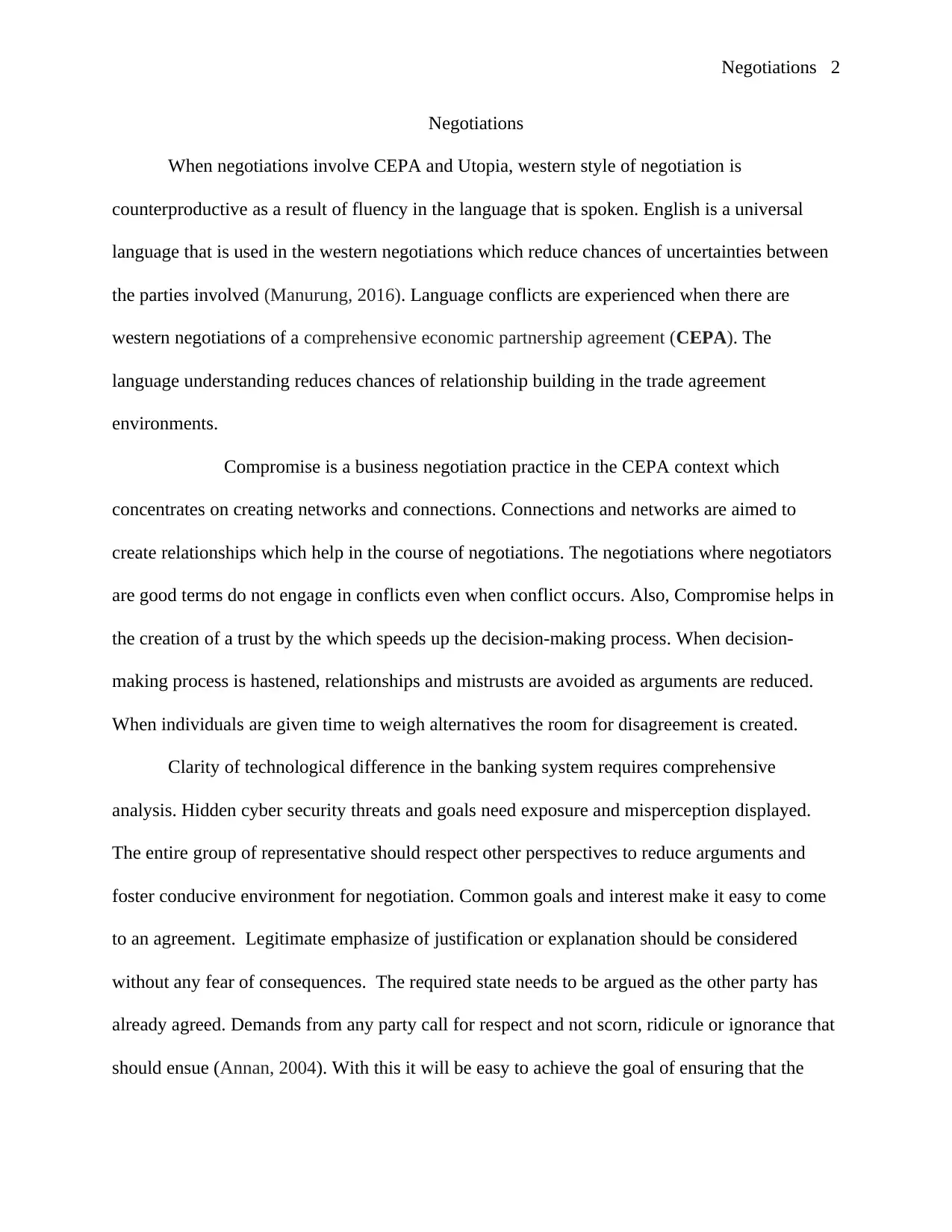
Negotiations 2
Negotiations
When negotiations involve CEPA and Utopia, western style of negotiation is
counterproductive as a result of fluency in the language that is spoken. English is a universal
language that is used in the western negotiations which reduce chances of uncertainties between
the parties involved (Manurung, 2016). Language conflicts are experienced when there are
western negotiations of a comprehensive economic partnership agreement (CEPA). The
language understanding reduces chances of relationship building in the trade agreement
environments.
Compromise is a business negotiation practice in the CEPA context which
concentrates on creating networks and connections. Connections and networks are aimed to
create relationships which help in the course of negotiations. The negotiations where negotiators
are good terms do not engage in conflicts even when conflict occurs. Also, Compromise helps in
the creation of a trust by the which speeds up the decision-making process. When decision-
making process is hastened, relationships and mistrusts are avoided as arguments are reduced.
When individuals are given time to weigh alternatives the room for disagreement is created.
Clarity of technological difference in the banking system requires comprehensive
analysis. Hidden cyber security threats and goals need exposure and misperception displayed.
The entire group of representative should respect other perspectives to reduce arguments and
foster conducive environment for negotiation. Common goals and interest make it easy to come
to an agreement. Legitimate emphasize of justification or explanation should be considered
without any fear of consequences. The required state needs to be argued as the other party has
already agreed. Demands from any party call for respect and not scorn, ridicule or ignorance that
should ensue (Annan, 2004). With this it will be easy to achieve the goal of ensuring that the
Negotiations
When negotiations involve CEPA and Utopia, western style of negotiation is
counterproductive as a result of fluency in the language that is spoken. English is a universal
language that is used in the western negotiations which reduce chances of uncertainties between
the parties involved (Manurung, 2016). Language conflicts are experienced when there are
western negotiations of a comprehensive economic partnership agreement (CEPA). The
language understanding reduces chances of relationship building in the trade agreement
environments.
Compromise is a business negotiation practice in the CEPA context which
concentrates on creating networks and connections. Connections and networks are aimed to
create relationships which help in the course of negotiations. The negotiations where negotiators
are good terms do not engage in conflicts even when conflict occurs. Also, Compromise helps in
the creation of a trust by the which speeds up the decision-making process. When decision-
making process is hastened, relationships and mistrusts are avoided as arguments are reduced.
When individuals are given time to weigh alternatives the room for disagreement is created.
Clarity of technological difference in the banking system requires comprehensive
analysis. Hidden cyber security threats and goals need exposure and misperception displayed.
The entire group of representative should respect other perspectives to reduce arguments and
foster conducive environment for negotiation. Common goals and interest make it easy to come
to an agreement. Legitimate emphasize of justification or explanation should be considered
without any fear of consequences. The required state needs to be argued as the other party has
already agreed. Demands from any party call for respect and not scorn, ridicule or ignorance that
should ensue (Annan, 2004). With this it will be easy to achieve the goal of ensuring that the
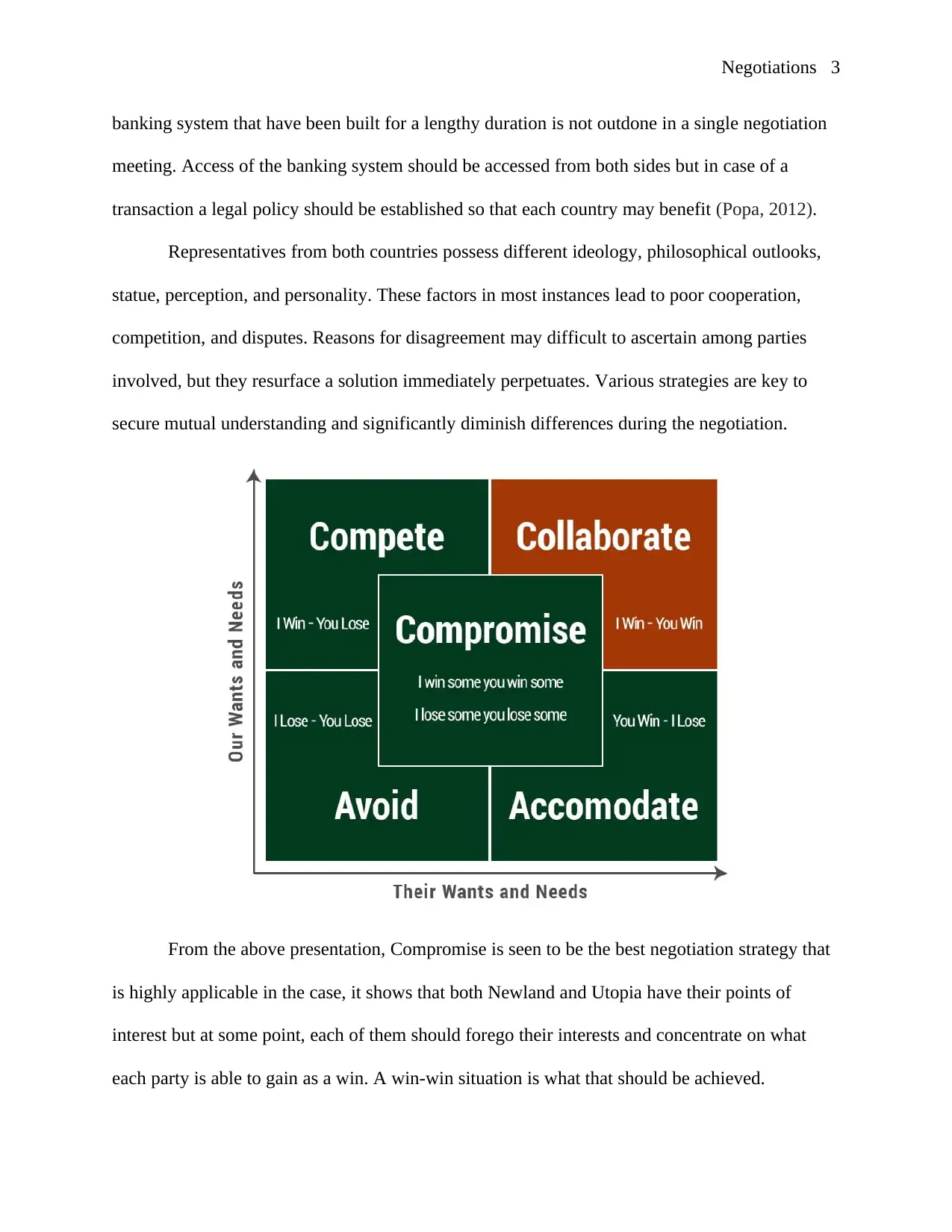
Negotiations 3
banking system that have been built for a lengthy duration is not outdone in a single negotiation
meeting. Access of the banking system should be accessed from both sides but in case of a
transaction a legal policy should be established so that each country may benefit (Popa, 2012).
Representatives from both countries possess different ideology, philosophical outlooks,
statue, perception, and personality. These factors in most instances lead to poor cooperation,
competition, and disputes. Reasons for disagreement may difficult to ascertain among parties
involved, but they resurface a solution immediately perpetuates. Various strategies are key to
secure mutual understanding and significantly diminish differences during the negotiation.
From the above presentation, Compromise is seen to be the best negotiation strategy that
is highly applicable in the case, it shows that both Newland and Utopia have their points of
interest but at some point, each of them should forego their interests and concentrate on what
each party is able to gain as a win. A win-win situation is what that should be achieved.
banking system that have been built for a lengthy duration is not outdone in a single negotiation
meeting. Access of the banking system should be accessed from both sides but in case of a
transaction a legal policy should be established so that each country may benefit (Popa, 2012).
Representatives from both countries possess different ideology, philosophical outlooks,
statue, perception, and personality. These factors in most instances lead to poor cooperation,
competition, and disputes. Reasons for disagreement may difficult to ascertain among parties
involved, but they resurface a solution immediately perpetuates. Various strategies are key to
secure mutual understanding and significantly diminish differences during the negotiation.
From the above presentation, Compromise is seen to be the best negotiation strategy that
is highly applicable in the case, it shows that both Newland and Utopia have their points of
interest but at some point, each of them should forego their interests and concentrate on what
each party is able to gain as a win. A win-win situation is what that should be achieved.
⊘ This is a preview!⊘
Do you want full access?
Subscribe today to unlock all pages.

Trusted by 1+ million students worldwide
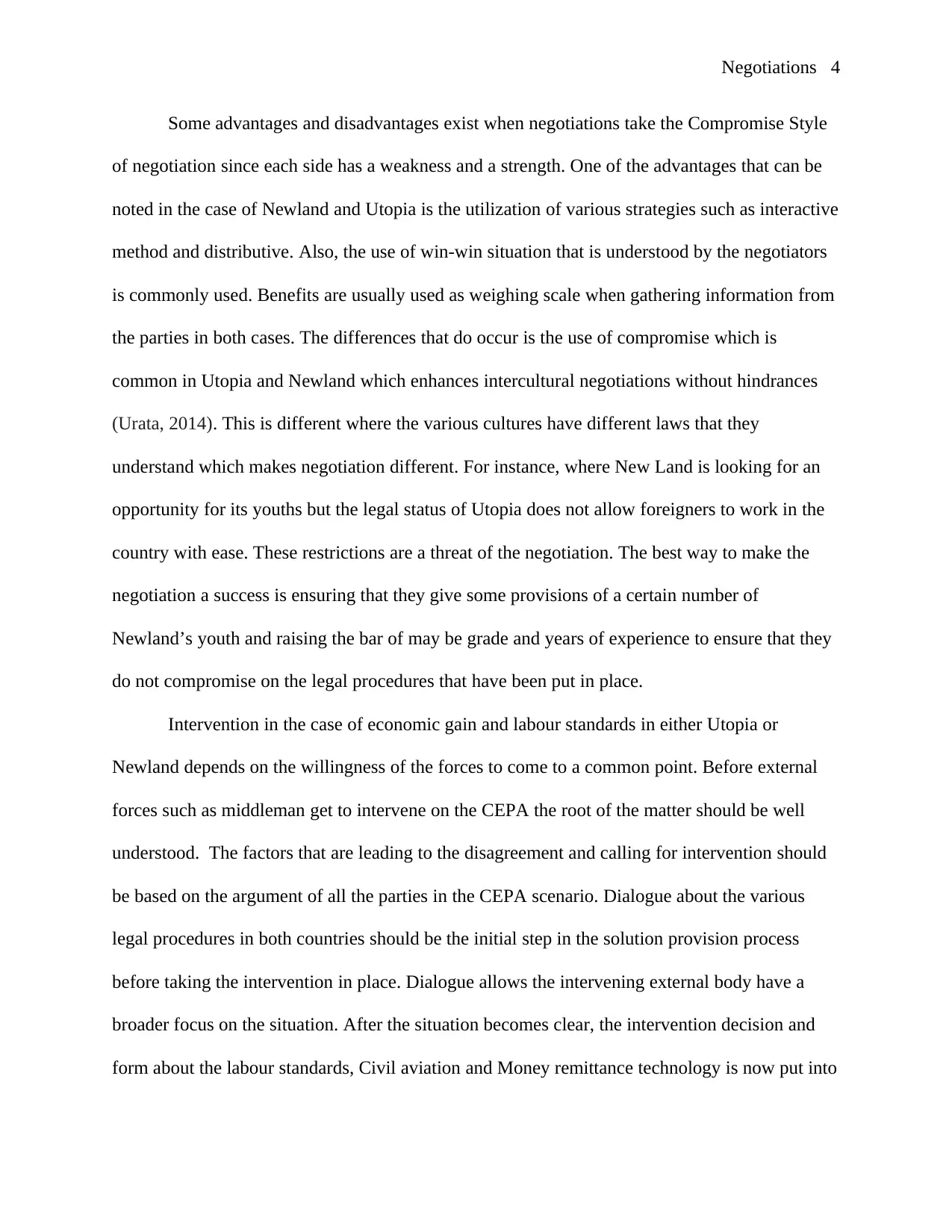
Negotiations 4
Some advantages and disadvantages exist when negotiations take the Compromise Style
of negotiation since each side has a weakness and a strength. One of the advantages that can be
noted in the case of Newland and Utopia is the utilization of various strategies such as interactive
method and distributive. Also, the use of win-win situation that is understood by the negotiators
is commonly used. Benefits are usually used as weighing scale when gathering information from
the parties in both cases. The differences that do occur is the use of compromise which is
common in Utopia and Newland which enhances intercultural negotiations without hindrances
(Urata, 2014). This is different where the various cultures have different laws that they
understand which makes negotiation different. For instance, where New Land is looking for an
opportunity for its youths but the legal status of Utopia does not allow foreigners to work in the
country with ease. These restrictions are a threat of the negotiation. The best way to make the
negotiation a success is ensuring that they give some provisions of a certain number of
Newland’s youth and raising the bar of may be grade and years of experience to ensure that they
do not compromise on the legal procedures that have been put in place.
Intervention in the case of economic gain and labour standards in either Utopia or
Newland depends on the willingness of the forces to come to a common point. Before external
forces such as middleman get to intervene on the CEPA the root of the matter should be well
understood. The factors that are leading to the disagreement and calling for intervention should
be based on the argument of all the parties in the CEPA scenario. Dialogue about the various
legal procedures in both countries should be the initial step in the solution provision process
before taking the intervention in place. Dialogue allows the intervening external body have a
broader focus on the situation. After the situation becomes clear, the intervention decision and
form about the labour standards, Civil aviation and Money remittance technology is now put into
Some advantages and disadvantages exist when negotiations take the Compromise Style
of negotiation since each side has a weakness and a strength. One of the advantages that can be
noted in the case of Newland and Utopia is the utilization of various strategies such as interactive
method and distributive. Also, the use of win-win situation that is understood by the negotiators
is commonly used. Benefits are usually used as weighing scale when gathering information from
the parties in both cases. The differences that do occur is the use of compromise which is
common in Utopia and Newland which enhances intercultural negotiations without hindrances
(Urata, 2014). This is different where the various cultures have different laws that they
understand which makes negotiation different. For instance, where New Land is looking for an
opportunity for its youths but the legal status of Utopia does not allow foreigners to work in the
country with ease. These restrictions are a threat of the negotiation. The best way to make the
negotiation a success is ensuring that they give some provisions of a certain number of
Newland’s youth and raising the bar of may be grade and years of experience to ensure that they
do not compromise on the legal procedures that have been put in place.
Intervention in the case of economic gain and labour standards in either Utopia or
Newland depends on the willingness of the forces to come to a common point. Before external
forces such as middleman get to intervene on the CEPA the root of the matter should be well
understood. The factors that are leading to the disagreement and calling for intervention should
be based on the argument of all the parties in the CEPA scenario. Dialogue about the various
legal procedures in both countries should be the initial step in the solution provision process
before taking the intervention in place. Dialogue allows the intervening external body have a
broader focus on the situation. After the situation becomes clear, the intervention decision and
form about the labour standards, Civil aviation and Money remittance technology is now put into
Paraphrase This Document
Need a fresh take? Get an instant paraphrase of this document with our AI Paraphraser
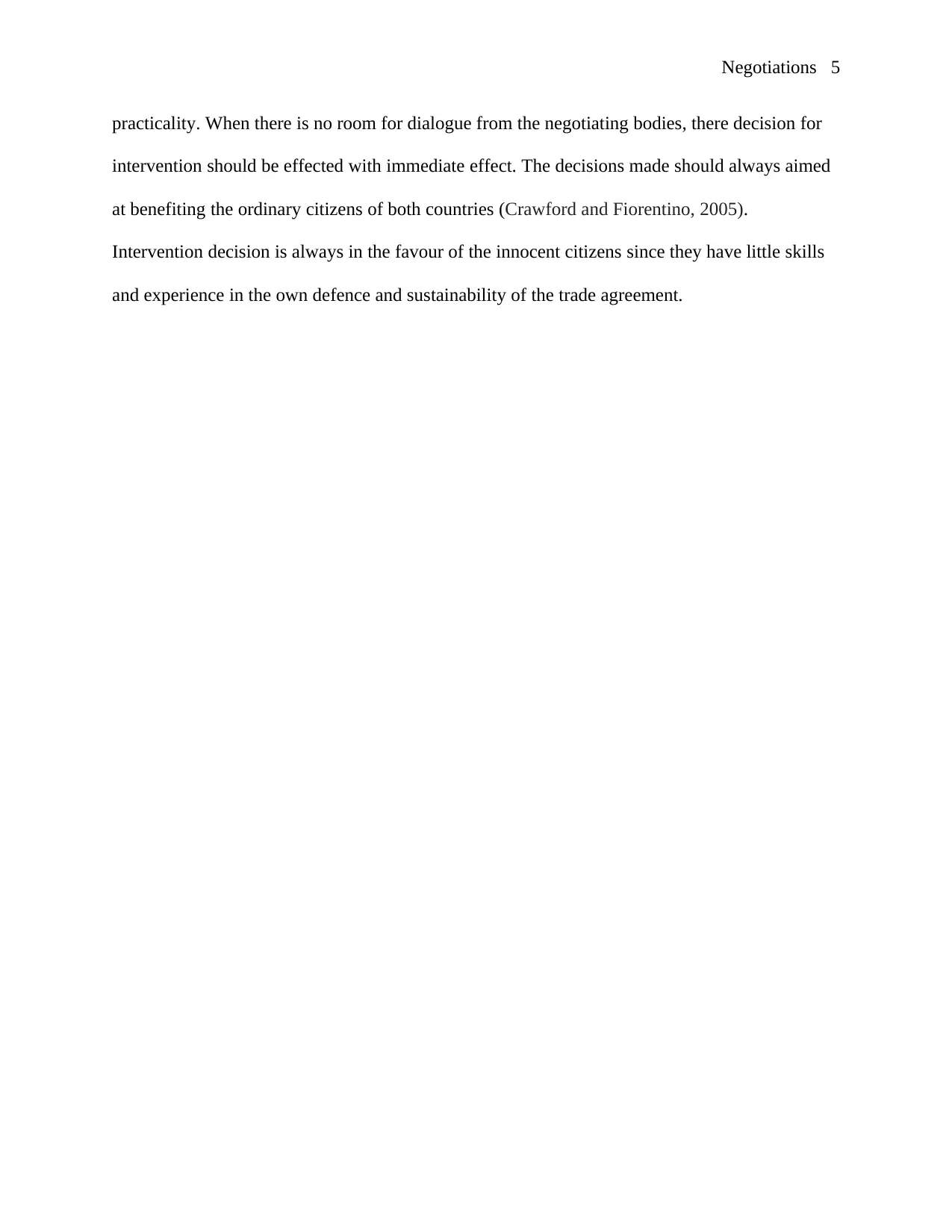
Negotiations 5
practicality. When there is no room for dialogue from the negotiating bodies, there decision for
intervention should be effected with immediate effect. The decisions made should always aimed
at benefiting the ordinary citizens of both countries (Crawford and Fiorentino, 2005).
Intervention decision is always in the favour of the innocent citizens since they have little skills
and experience in the own defence and sustainability of the trade agreement.
practicality. When there is no room for dialogue from the negotiating bodies, there decision for
intervention should be effected with immediate effect. The decisions made should always aimed
at benefiting the ordinary citizens of both countries (Crawford and Fiorentino, 2005).
Intervention decision is always in the favour of the innocent citizens since they have little skills
and experience in the own defence and sustainability of the trade agreement.
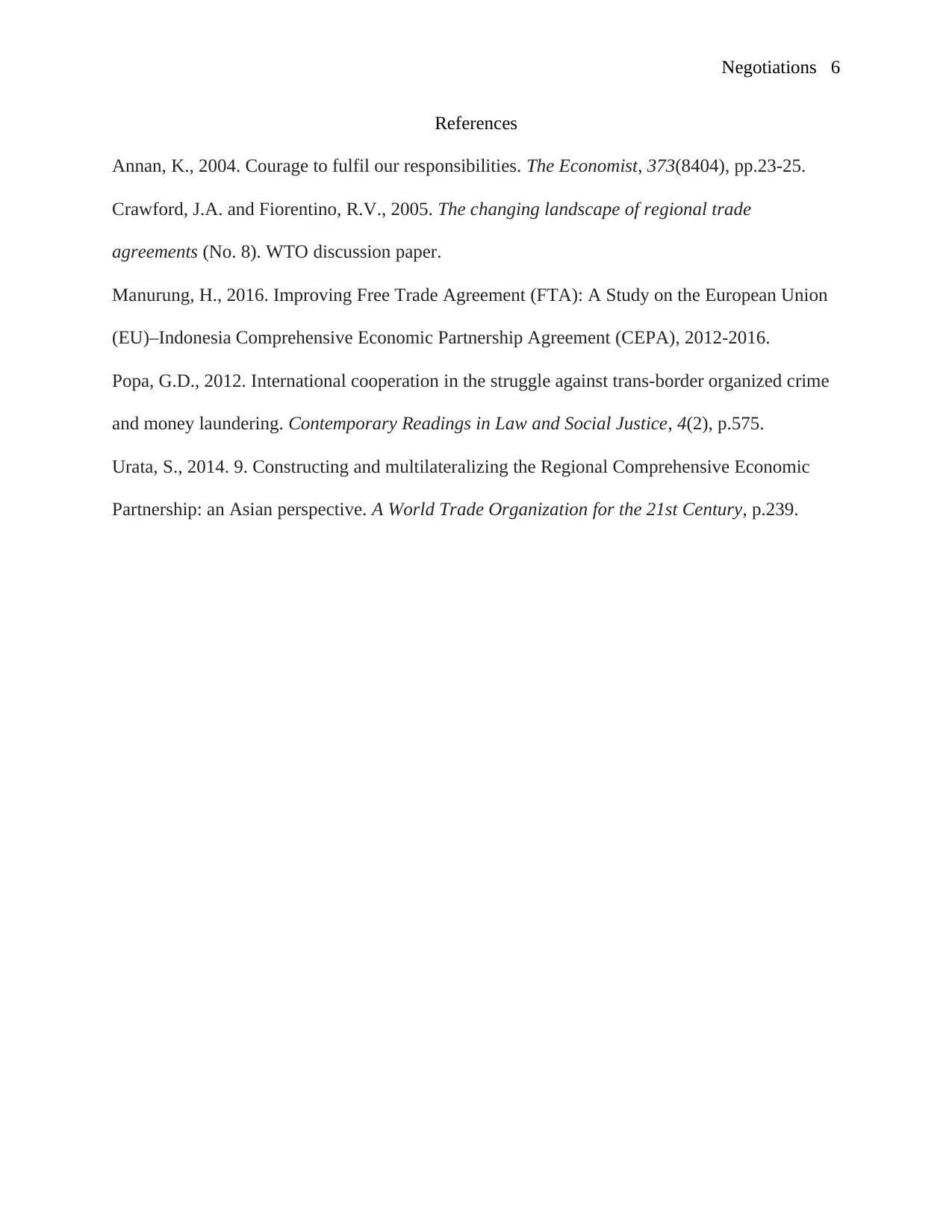
Negotiations 6
References
Annan, K., 2004. Courage to fulfil our responsibilities. The Economist, 373(8404), pp.23-25.
Crawford, J.A. and Fiorentino, R.V., 2005. The changing landscape of regional trade
agreements (No. 8). WTO discussion paper.
Manurung, H., 2016. Improving Free Trade Agreement (FTA): A Study on the European Union
(EU)–Indonesia Comprehensive Economic Partnership Agreement (CEPA), 2012-2016.
Popa, G.D., 2012. International cooperation in the struggle against trans-border organized crime
and money laundering. Contemporary Readings in Law and Social Justice, 4(2), p.575.
Urata, S., 2014. 9. Constructing and multilateralizing the Regional Comprehensive Economic
Partnership: an Asian perspective. A World Trade Organization for the 21st Century, p.239.
References
Annan, K., 2004. Courage to fulfil our responsibilities. The Economist, 373(8404), pp.23-25.
Crawford, J.A. and Fiorentino, R.V., 2005. The changing landscape of regional trade
agreements (No. 8). WTO discussion paper.
Manurung, H., 2016. Improving Free Trade Agreement (FTA): A Study on the European Union
(EU)–Indonesia Comprehensive Economic Partnership Agreement (CEPA), 2012-2016.
Popa, G.D., 2012. International cooperation in the struggle against trans-border organized crime
and money laundering. Contemporary Readings in Law and Social Justice, 4(2), p.575.
Urata, S., 2014. 9. Constructing and multilateralizing the Regional Comprehensive Economic
Partnership: an Asian perspective. A World Trade Organization for the 21st Century, p.239.
⊘ This is a preview!⊘
Do you want full access?
Subscribe today to unlock all pages.

Trusted by 1+ million students worldwide
1 out of 6
Related Documents
Your All-in-One AI-Powered Toolkit for Academic Success.
+13062052269
info@desklib.com
Available 24*7 on WhatsApp / Email
![[object Object]](/_next/static/media/star-bottom.7253800d.svg)
Unlock your academic potential
Copyright © 2020–2025 A2Z Services. All Rights Reserved. Developed and managed by ZUCOL.




